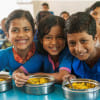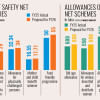Food distribution for poor: When more is needed, govt doing less

Scaling up public food distribution programmes for the poor and the vulnerable is the need of the hour -- given the cost of living crisis. But the government seems to be shying away from stepping up to this task.
So far this fiscal year, it has distributed about 15 lakh tonnes of rice and wheat through its various food distribution programmes under the social safety net schemes, down 6 percent year-on-year, according to data from the food ministry until January 19.
"This is difficult to fathom at a time of soaring prices," said Zahid Hussain, a former lead economist of the World Bank's Dhaka office.
Inflation averaged 8.76 percent in the first six months of the fiscal year, up from 5.7 percent a year earlier, according to data from the Bangladesh Bureau of Statistics.
In December, inflation stood at 8.71 percent and in rural areas 8.86 percent. But the wage rate grew at 7.03 percent.
Given the recent hike in energy prices, inflation is expected to spiral further, said Bazlul Haque Khondker, chairman of the South Asian Network on Economic Modelling.
How the low-income groups will manage then remains a burning issue given the government's half-hearted response now.
"When the government needed to expand its social protection programmes, it did not," Khondker said.
What is more puzzling is that the government has enough food stock to assist the poor and low-income families in a bigger way.
A food stock of 12 lakh metric tonnes is considered adequate and the government has 19 lakh metric tonnes at present.
"The government should insist on doing more," said Khondker, also a professor at the University of Dhaka's economics department.
Yesterday, coarse rice, which is consumed mostly by the poor and low-income people, sold for Tk 46-52 a kilogram in Dhaka city, up 3-4 percent from a year earlier, according to the Trading Corporation of Bangladesh.
Wheat, another staple, saw its price soar 66 percent to Tk 58-60 per kg.
And it is in wheat distribution that the government has scaled back: by 27.5 percent to 254,272 metric tonnes.
The rise in the import price of wheat following the war in Ukraine appears to have played a role in the lower wheat distribution, according to Hussain.
"But this cannot be an acceptable excuse."
The authorities could have adjusted the composition of food by increasing the quantity of rice to replace wheat.
"The government has consistently claimed that the public stock of rice never dipped below safe levels. Yet the composition of food was not adjusted."
There was also no food distribution under the Test Relief and school feeding programmes.
"These tend to reach the poor better than many other welfare and workfare programmes."
Open-market sales, the only social assistance for urban households, should have been increased by a large margin, Hussain said.
"We were under the impression this was being scaled up in response to food inflation reaching levels not seen in recent memory."
Data shows it increased by just 1.3 percent, data shows.
"It appears that the pro-poor elements of public expenditure are eroding at a time when they need to increase very significantly," Hussain added.
If the authorities face any supply chain disruption, they must ensure the substitute product to fill up the gap, Khondker said, while calling on the government to hunt for other sources like Canada for wheat.
Tapan Kumar Das, director (in-charge) of the department of supply, distribution and marketing of the directorate general of food, acknowledged the lower food distribution, which he blamed on the supply chain disruptions brought on by the pandemic and the Ukraine war.
"Basically, we have a shortage of wheat distribution," he said, adding that local production accounts for just 12-15 percent of the country's total requirement.
There is sufficient wheat stock now, Das said.
He, however, denied that the government has cut back on rice distribution this fiscal year. Rather, the government saved about 75,000 tonnes of rice from the food-friendly programme after the authority detected a huge number of fake beneficiaries across the country.
Asked whether the government is considering substituting rice for wheat in the food distribution programmes, he declined to comment.
The food secretary and the director general of DG Food did not respond to The Daily Star's request for comment.


 For all latest news, follow The Daily Star's Google News channel.
For all latest news, follow The Daily Star's Google News channel. 








Comments